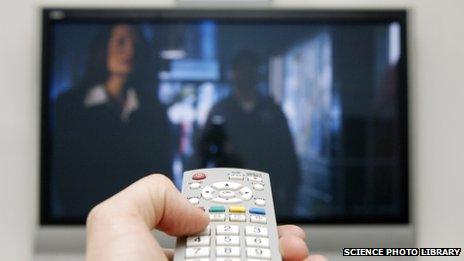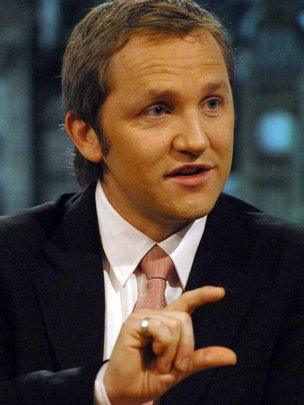TV licence fee decriminalisation 'could close BBC channels'
- Published

The licence fee currently costs £145.50 a year
Decriminalising TV licence fee evasion could close BBC channels, the corporation's strategy director has warned.
James Purnell said it would increase non-payment and cost the BBC £200m.
The sum is the equivalent of BBC Four, CBBC and CBeebies, which would have to be taken off air, Mr Purnell said at an event to relaunch the iPlayer service.
Culture Secretary Maria Miller said the move should be discussed during talks to renew the BBC's charter before 2017.
Mr Purnell, who previously held the post in the Labour government, said "it would be a huge risk to do it now".
"The choice would be: either we take those services off or the government would have to have a higher licence fee," he said in reference to BBC Four - the arts and culture channel - and the BBC's children's stations.
He argued decriminalisation would inevitably lead to greater non-payment of the TV licence, which would force an increase in the fee.

James Purnell previously worked at the BBC in the 1990s before becoming an MP
It is currently £145.50 and has been frozen at that annual amount since 2010. It is needed to watch or record live broadcasts on any device.
In 2012 about 155,000 people were convicted and fined for not paying the licence fee, while there were some 180,000 prosecutions.
Mr Purnell added downgrading licence fee evasion to a civil offence would penalise the poor.
"Either you have a low penalty - in which case the evasion rates would go up and everyone would have to pay a higher licence fee - or a penalty which is higher and more difficult to pay," he said.
The BBC has previously said "legislation is a matter for the government".
"Just a 1% increase in evasion would lead to the loss of around £35m, the equivalent of around 10 BBC local radio stations," it added.
The government has floated the idea to ease pressure on the courts system.
But it will not be discussed before charter renewal talks - which determine how the BBC is funded what it does and how it is managed.
The current BBC charter runs out in 2016.
Meanwhile, Labour MP John McDonnell has tabled an Early Day Motion in parliament calling on the BBC to reverse its decision to close BBC Three as a television channel.
The motion stated BBC Three has been the home of programmes including Gavin and Stacey, and raised fears changes could lead to compulsory redundancies.
It added the BBC should receive a licence fee increase that tracks inflation when the corporation's charter is renewed next year.
- Published8 March 2014
- Published10 March 2014
- Published24 February 2014
- Published26 February 2014